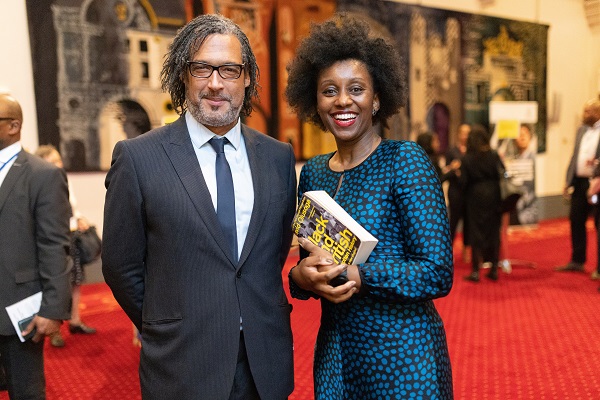
I think lectures like Professor Olusoga’s, though informative, engaging and absolutely necessary, are difficult. Difficult because once you begin to understand the implications of their content there can be no recourse to a previous mindset and viewpoint. Professor Olusoga referred to this very moment in his own life, a Matrix-like red pill, blue pill decision from which there is no going back.
The lecture was structured around the statues of three men- Edward Colston, Sir John Cass, and Alderman William Beckford- who were closely involved in the City of London and the British Slave Trade. Their statues have featured heavily in recent discourse and discussion, with each finding a different end, and this reappraisal of our history has led to the discovery of previously hidden parts of Britain’s past. This was a point that Professor Olusoga was keen to stress; re-investigating the past does not lead to an erasure of history- the true history is in fact being discovered and in some cases being told for the first time. Furthermore, this newly-found knowledge can now be used to inform a further discussion and investigation of our past.
This was my first key takeaway from the lecture; uncovering our history is a cumulative process in which a greater understanding of our past in turn enables a deeper investigation. This Age of Historical Reckoning is changing the unknown unknowns into the known unknowns, and as hidden parts of Britain’s colonial past are discovered and brought to light through academic research and publication, we can begin to understand their modern-day implications.
Numerous studies1 show that ethnic minority groups are more likely to live in deprived neighboroughoods than the White British majority, but the impacts of history go beyond simple socioeconomics or demography. As Professor Olusoga explained, the current consistent disadvantage suffered by Black business, as reflected in the disproportionate success rates of Ethnically Owned Minority Business, is a direct consequence of history. As we begin to understand more about the past the primary question for me becomes how to address it.
An often-discussed point, and one that featured in the post-lecture Q and A, is one of reparations. Reparations are not some invention of 1960’s African American academics, as Professor Olusoga was keen to highlight, with Germany paying France after the First World War and Congress repaying Japanese-Americans who were interned during the Second World War. Furthermore, the emotional desire behind them seems clear to me. In the words of Janna Thompson ‘injustice can cast a long'2 with the descendants of victims likely to lack resources and opportunities that would have been available had the injustice not been done. This idea of ‘justice as equity’ may in fact require that these descendants be compensated for the disadvantageous social position that they were born in to.
In some ways this ‘compensation’ is already happening, with a range of organisations pushing forward with efforts regarding ethnic diversity and inclusion. As companies and institutions are being demanded to provide restorative action and investigate their past there has been a growing body of scholarship and ‘business think’ explaining the benefits of diversity, the need to acknowledge intersectionality, and the profit incentives behind greater inclusion. However, these institutional changes, be it specific graduate schemes or employment directives, are only relevant for those looking to work for a business, not start their own. Alone, together3, a report by the British Business Bank, notes that ‘there is not a level playing field in entrepreneurship, whether for opportunities or outcomes’ and this is something we must address if we are to effectively tackle the disadvantage resulting from Britain’s past.
The UK is a network-based society, as Professor Olusoga and the report noted, and these relationships can lead to new markets, partnerships, or mentoring that would previously be inaccessible. Alone, together has shown that faster growing businesses have higher levels of engagement with business support and training positive, as well as a positive relationship between inclusion in business networks and entrepreneurial success. I believe support for this kind of network engagement can provide compensation and restorative action with an impact far beyond the conventional idea of reparations. Similar to the ‘teach a man to fish’ adage, business networks can provide long term opportunities that will tackle structural injustice beyond the effects of a one-off reparation payment. I actually believe supporting these kinds of networks aligns more with the principle of reparations Janna Thompson was referring to- the support is a mechanism to compensate people for, and provide a long-term route out of, the disadvantageous social position which they are born in to.
I think the Black Business Association can be viewed as one such form of this compensation. The Association is a purposeful outlet for Black business owners and employees, bringing people together and enabling networking and promoting Black entrepreneurs and business ownership in the capital. As lectures like Professor Olusoga’s change the unknown unknowns into the known unknows and shine a light onto previously concealed history it is what we do with this new knowledge that matters. It is the Chamber’s hope that the BBA can be utilised as a mechanism through which previously disadvantaged groups can access and benefit from all that London has to offer.
- GOV.UK (2020).People living in deprived neighbourhoods.
- Thompson, J. (2001). Historical Injustice and Reparation: Justifying Claims of Descendants. Ethics, 112(1), 114–135.
- British Business Bank (2020). Alone, together.
Sami Azam-Ali, Research Assistant, LCC